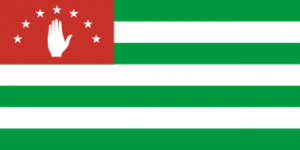Language/Abkhazian/Grammar/Adjectival-Agreement-in-Abkhazian
 Հայերէն
Հայերէն Български език
Български език 官话
官话 官話
官話 Hrvatski jezik
Hrvatski jezik Český jazyk
Český jazyk Nederlands
Nederlands English
English Suomen kieli
Suomen kieli Français
Français Deutsch
Deutsch עברית
עברית हिन्दी
हिन्दी Magyar
Magyar Bahasa Indonesia
Bahasa Indonesia فارسی
فارسی Italiano
Italiano 日本語
日本語 Қазақ тілі
Қазақ тілі 한국어
한국어 Lietuvių kalba
Lietuvių kalba Νέα Ελληνικά
Νέα Ελληνικά Şimali Azərbaycanlılar
Şimali Azərbaycanlılar Język polski
Język polski Português
Português Limba Română
Limba Română Русский язык
Русский язык Српски
Српски Español
Español العربية القياسية
العربية القياسية Svenska
Svenska Wikang Tagalog
Wikang Tagalog தமிழ்
தமிழ் ภาษาไทย
ภาษาไทย Türkçe
Türkçe Українська мова
Українська мова Urdu
Urdu Tiếng Việt
Tiếng Việt
| ◀️ Noun Cases in Abkhazian — Previous Lesson | Next Lesson — The Abkhazian War and Conflict ▶️ |
As we continue our journey of learning Abkhazian, we will now delve into adjectival agreement in Abkhazian. Adjectives in Abkhazian not only describe nouns, but they must also agree with the noun they modify in gender, number and case. Understanding adjectival agreement is essential for gaining proficiency in the Abkhazian language.
Take some time to dive into these other pages after completing this lesson: Noun Cases in Abkhazian & Adverbs of Time in Abkhazian.
Adjectival Agreement
In Abkhazian language, an adjective usually comes after the noun it modifies. The adjective must agree with the noun it modifies.
|- !Gender !Singular !Plural |- |Animate |style="text-align:center;" colspan="2" | Add -а after the last consonant of the word. If the stressed syllable is not the last, -а replaces the last vowel of the word. |- |Inanimate |Add -ы after the last consonant of the word. If the stressed syllable is not the last, -ы replaces the last vowel of the word. |Add -тә after the last consonant of the word. If the stressed syllable is not the last, -тә replaces the last vowel of the word. |}
Example:
| Abkhazian | Pronunciation | English |
|---|---|---|
| аҳәырра | aharra | beautiful (masculine, animate) |
| аҳәыррым | aharrym | beautiful (masculine, inanimate, singular) |
| аҳәыррытә | aharrytə | beautiful (masculine, inanimate, plural) |
| аҩәәзә | aԥəԥə | beautiful (feminine, animate) |
| аҩәгә | aԥəgə | beautiful (feminine, inanimate) |
Noun Case Endings and Adjectival Agreement
Nouns in Abkhazian change their endings to reflect their case. There are six cases in Abkhazian: nominative, ergative, genitive, dative, ablative, and adverbial. The adjectives must also agree with the noun in its case.
Here are example cases and adjective agreement:
Nominative case:
Example:
| Abkhazian | Pronunciation | English |
|---|---|---|
| ҕьанқәын | ğankəın | beautiful girl |
As you can see, the adjective ҳәырра (beautiful) agrees with the feminine, singular noun ҕьанқәын (girl) in the nominative case.
Genitive case:
Example:
| Abkhazian | Pronunciation | English |
|---|---|---|
| аблашәыш | ablaşəış | beautiful dress |
Here, the adjective аҳәыррым (beautiful) agrees with the feminine, singular noun абла (dress) in the genitive case.
Conclusion
Now that you understand adjectival agreement in Abkhazian, you are one step closer to mastering this beautiful language. Keep in mind that it takes time and patience to become fluent in Abkhazian, and practice makes perfect. Make sure to use these tips and techniques when speaking and writing in Abkhazian, and you will be well on your way to proficiency. Good luck!
Sources
Finished this lesson? Check out these related lessons: Word Order in Abkhazian & Give your Opinion.
Other Lessons
- Adverbs of Time in Abkhazian
- Questions
- Use of Verbs in Past and Future Tenses
- Adjectives
- Conditional Mood
- 0 to A1 Course
- Nouns
- Give your Opinion
- Noun Cases in Abkhazian
- Word Order in Abkhazian
Template:Abkhazian-Page-Bottom
| ◀️ Noun Cases in Abkhazian — Previous Lesson | Next Lesson — The Abkhazian War and Conflict ▶️ |

